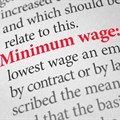The National Minimum Wage Commission (NMWC) has released its recommendations for 2025, and the public have until Tuesday, 14 January to comment. This moment provides an opportunity to critically assess the effectiveness of the National Minimum Wage (NMW) policy in addressing South Africa’s cost-of-living crisis and its broader socioeconomic impact.
Introduced in 2018, the National Minimum Wage Act was heralded as a landmark initiative to combat poverty and reduce income inequality. The Act mandates an annual review of the minimum wage to ensure it remains aligned with inflation and economic realities.
For 2025, the NMWC has proposed an adjustment based on the Consumer Price Index (CPI) plus 1.5%, aiming to preserve the purchasing power of workers in an increasingly challenging economic climate. With the current minimum wage set at R27.58 per hour, this adjustment represents a lifeline for many low-income workers battling escalating living costs.
While the Act’s objectives include alleviating poverty, narrowing wage gaps, and promoting fair compensation, its broader efficacy remains a contentious issue. The latest NMWC report highlights some progress, such as gradual reductions in wage disparities and real wage improvements for low-income workers.
However, the policy’s ability to address systemic socioeconomic challenges is under scrutiny.
For workers
The minimum wage provides a critical safety net, ensuring fair compensation for the most vulnerable workers. It plays a pivotal role in alleviating poverty and reducing income inequality, enabling workers to meet their basic needs.
For employers
The policy poses challenges, particularly for small businesses. Balancing wage increases with business sustainability is a delicate task, and some employers may struggle to meet the new requirements without compromising their viability or shedding jobs.
For the economy
Adjusting the minimum wage has far-reaching implications for inflation, purchasing power, and economic stability. When calibrated effectively, it can stimulate economic activity by enhancing the purchasing power of low-wage earners. However, its impact must be carefully managed to avoid unintended consequences.
The cost-of-living crisis: A persistent challenge
South Africa’s economic landscape is defined by soaring inflation, high unemployment, and deepening inequality. Official statistics place the food poverty line at R796 per person per month and the upper-bound poverty line at R1,634. For many minimum wage earners, these modest thresholds remain unattainable.
While the proposed wage adjustment offers some relief, it is unlikely to significantly ease the financial burden on households. Inflation disproportionately affects lower-income households, as essential goods and services consume a significant portion of their earnings.
Although the CPI adjustment mechanism aims to maintain the real value of wages, it risks being outpaced by the volatile economic environment, particularly in sectors like agriculture and domestic work, where non-compliance with the NMW is prevalent.
The NMW’s impact on employment remains a contentious issue. While the NMWC report suggests marginal negative effects on employment, concerns persist about the policy’s impact on small, medium, and micro-enterprises (SMMEs). Labour-intensive businesses, already grappling with structural challenges such as load-shedding, rising input costs, and limited access to capital, often struggle to absorb wage increases.
The agricultural sector has been particularly vocal about the unintended consequences of the NMW. Employers argue that the policy exacerbates operational challenges, leading to job cuts and increased mechanisation. Although the NMWC’s provision for wage exemptions offers some relief, it is criticised for being overly complex and difficult to access.
Broader socioeconomic landscape
While the NMW aims to address immediate wage disparities, it is not a panacea for South Africa’s deep-seated socioeconomic challenges. High unemployment, inadequate skills development, and stagnant economic growth undermine the policy’s effectiveness.
Without complementary measures—such as targeted job creation initiatives, enhanced enforcement of wage laws, and investments in education and training—the NMW risks being a well-intentioned but insufficient intervention.
The National Minimum Wage Act is undeniably a step towards social justice, providing a critical safety net for millions of workers. However, its ability to address the cost-of-living crisis and foster long-term economic resilience remains limited.
The proposed 2025 adjustment will offer some relief, but for many South Africans, it will be a drop in the ocean of economic hardship. To maximise its impact, the NMW must be part of a broader, integrated strategy that addresses the root causes of poverty and inequality.
Only through a comprehensive approach can the NMW fulfil its promise as a tool for equitable and sustainable development.
If you would like to comment on these recommendations, please email your comments to az.vog.ruobal@weiverwmn by Tuesday, 14 January 2025.



